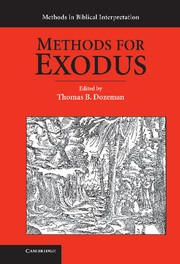Book contents
Introduction
Published online by Cambridge University Press: 05 June 2012
Summary
THE GOALS OF THE BOOK
Methods for Exodus is intended to be a textbook for students on biblical methodology. We have two aims in writing this book. Our first goal is to introduce six distinct methodologies that aid in the interpretation of the book of Exodus. The six methodologies are literary and rhetorical, genre, source and redaction, liberation, feminist, and postcolonial criticisms. These methodologies are not exhaustive, but they illustrate the range of contemporary critical interpretations of the book of Exodus. The introduction of the distinct methodologies is similar to many other books on methodology that are available to students. Yet we hope to contribute to the growing literature on the subject by focusing in particular on the role of the six methodologies in the interpretation of the book of Exodus. To this end, each of the following six chapters of the volume will illustrate how a particular methodology has contributed to the interpretation of the book of Exodus. The authors will clarify the hermeneutical presuppositions of the methodology under study and the impact of the method on the interpretation of the book of Exodus as a whole. We have also selected Exodus 1–2 and 19–20 to illustrate in more detail the application of each methodology to specific texts.
Information
- Type
- Chapter
- Information
- Methods for Exodus , pp. 1 - 12Publisher: Cambridge University PressPrint publication year: 2010
